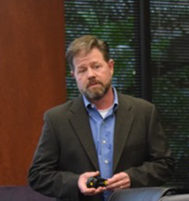Recycling in Greensboro is going to change and not for the better.
Greensboro signed an incredibly prescient recycling contract in 2012. It then renegotiated the contract in 2016 so the contract was extended to 2020. What that means is that until June 30, 2020 Greensboro can get paid $15 for each ton of recyclable material produced by the materials recovery facility (MRF).
Director of Field Operations Dale Wyrick explained to the City Council at its work session on Monday, that on June 30, 2020 when that contract ends the city loses all of its negotiating power as far as recycling goes. Wyrick recommended and the City Council informally agreed to move forward with a contract extension with Republic Services which will cost the city some money up front, but pay it back over time, similar to what the City Council did when it renegotiated the contract in 2016 and extended it at a reduced rate to 2020.
Councilmember Justin Outling asked for the specific figures that showed how much the city would save over the life of the proposed new contract. Wyrick said he had the figures and would send them to councilmembers.
What has happened to the recycling market is that the Chinese quit buying recyclables which caused the price of recyclables to fall through the floor. Some cities are doing away with their recycling programs all together because recycling has become so expensive.
The Greensboro City Council is still committed to recycling, but it is going to cost the city a whole lot more starting on July 1, the beginning of the 2019-2020 fiscal year when the new contract goes into effect.
Wyrick also recommended that the city stop recycling bottle glass, bulky rigid plastics, polycoated and aseptic containers and pots and pans.
Right now the city is getting paid $15 a ton for recyclable material, but starting July 1 the city will be paying $30 a ton and that price will rise to $90 a ton in 2021. Glass is heavy and recycled glass has a negative value, so it makes sense to cut it out of the recycling stream.
Wyrick said that for people who want to recycle glass there would be drop-off points in town where they could take glass, but it would not be recycled if it was put in the brown recycling bin.
The city is also going to put on a big push for people to do a better job of recycling. Wyrick said that Greensboro has always had a high “contamination rate” which is what they call trash in the recycling stream that is not recyclable. One reason it has always been high is that because of the contract there hasn’t been much incentive to try and get it lower, but Wyrick said with the news pricing structure Greensboro would have a lot of incentive to lower its contamination rate.
Wyrick said Greensboro had a big problem with “wishful recycling” where people who aren’t sure if something can be recycled put it in the recycling container wishing that it can.
Wyrick also said that as part of the extended contract Republic would agree to spend about $4.5 million on upgrading the current MRF.

